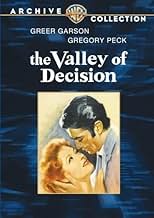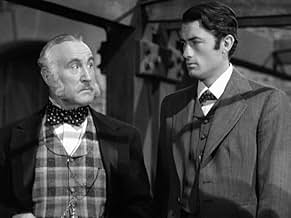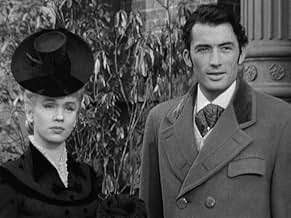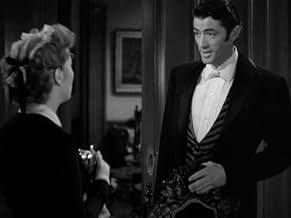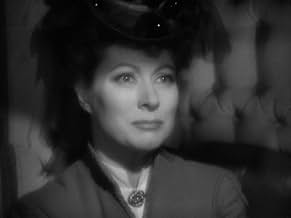NOTE IMDb
7,3/10
2,6 k
MA NOTE
Ajouter une intrigue dans votre langueAn Irish maid falls for the son of her wealthy boss, though their disapproving fathers and a bitter strike at the steel mill complicate matters.An Irish maid falls for the son of her wealthy boss, though their disapproving fathers and a bitter strike at the steel mill complicate matters.An Irish maid falls for the son of her wealthy boss, though their disapproving fathers and a bitter strike at the steel mill complicate matters.
- Réalisation
- Scénario
- Casting principal
- Nommé pour 2 Oscars
- 4 victoires et 2 nominations au total
Avis à la une
Greer Garson, with a terrific Irish brogue, earned still another Oscar nomination. With the exception of 1940, Miss Garson was nominated for best actress from 1939-1945, a Hollywood record.
The film depicts the old problem of wealth vs. poverty. A pretty and pert Greer goes to work for the family of Gregory Peck. They are lovely, unpretentious people. Her dad, played by the irascible Lionel Barrymore, is a hot head if ever there were. His hot-headedness will ultimately lead to his downfall as the film goes on.
We see wealth and snobbery associated with it, especially by Peck's wife, brilliantly played by a young Jessica Tandy. In a change of pace, veteran movie mother, Gladys Cooper, comes off as a wonderfully, kind sort of matriarch married to the indomitable Donald Crisp.
The ending is great. All I can say is that fairness triumphs over snobbery. Class distinctions just seem to go away.
The film depicts the old problem of wealth vs. poverty. A pretty and pert Greer goes to work for the family of Gregory Peck. They are lovely, unpretentious people. Her dad, played by the irascible Lionel Barrymore, is a hot head if ever there were. His hot-headedness will ultimately lead to his downfall as the film goes on.
We see wealth and snobbery associated with it, especially by Peck's wife, brilliantly played by a young Jessica Tandy. In a change of pace, veteran movie mother, Gladys Cooper, comes off as a wonderfully, kind sort of matriarch married to the indomitable Donald Crisp.
The ending is great. All I can say is that fairness triumphs over snobbery. Class distinctions just seem to go away.
When one thinks of Greer Garson, movies like "Mrs. Miniver" or "Pride and Prejudice" come to mind. And when one thinks of Gregory Peck, movies like "To Kill a Mockingbird" or "Gentleman's Agreement" come to mind. However, both of these terrific actors are fantastic in "The Valley of Decision," which I consider to be one of the forgotten classics of the 1940's. It was deservingly nominated for two Academy Awards, including a Best Actress nomination for Greer Garson. I believe she gives one of her most touching, heartfelt performances as Mary Rafferty. This movie is a must-see for all movie fans. I give it an enthusiastic 10 out of 10!
If you're interested in this movie, and others like it, and if you've gotten so far as to be reading this review, you probably already know the plot, so I don't need to get into all that. No, my purpose here, and in most of my other reviews, is to take a look at other aspects of the movie, such as acting, writing, etc.
So, here goes: "Valley of Decision" is overall a touching, well done movie. One of the best things is certainly the star power contained in the cast. We have the lovely Greer Garson, who really does a nice job in this. Gregory Peck is one of my favorite leading men, and what always impressed me is how quickly he rose to the top in Hollywood. "Valley of Decision" was only his third film, yet at only 29 years old he was already established as a lead. Donald Crisp, who seems to be in almost everything, is a reliable character actor as well. And now let me say a brief word in defense of Lionel Barrymore. I've noticed that a couple other reviews on here are saying that he ruins the film with his "ham overacting". Well, I'm sorry, but Lionel Barrymore was an acting genius, and maybe he was a ham, but in the acting world I think that's more often a good thing than bad. Let's face it: his role in this was not supposed to be subtle, and his character was not supposed to be likeable. Yes, perhaps his other film villains, such as Mr. Potter from "It's a Wonderful Life" were more poised and shrewd, but that was not called for in this. He played an embittered man who held on to a grudge for way too long, and it had terrible consequences. If Lionel Barrymore carried out his role the way he saw fit as the one playing the part, then so be it. Don't slam him for it. He didn't wreck the film, or his own portrayal of the character; he may have chosen to overplay the role, but I think his bitterness ended up being very effective, and his hatred convincingly disturbing.
Now that I'm finished with that, allow me to talk about the movie as a whole. It's very good, and I would definitely recommend it. It's a sweet, old-fashioned, uncomplicated love story, and I wish they still made movies like this today. What a shame that the majority of romances (and most other genres, come to think of it) made in this day and age are full of bad language and sex and/or nudity in every other scene. I have a true fondness and respect for the good old days when movies were movies!
So, here goes: "Valley of Decision" is overall a touching, well done movie. One of the best things is certainly the star power contained in the cast. We have the lovely Greer Garson, who really does a nice job in this. Gregory Peck is one of my favorite leading men, and what always impressed me is how quickly he rose to the top in Hollywood. "Valley of Decision" was only his third film, yet at only 29 years old he was already established as a lead. Donald Crisp, who seems to be in almost everything, is a reliable character actor as well. And now let me say a brief word in defense of Lionel Barrymore. I've noticed that a couple other reviews on here are saying that he ruins the film with his "ham overacting". Well, I'm sorry, but Lionel Barrymore was an acting genius, and maybe he was a ham, but in the acting world I think that's more often a good thing than bad. Let's face it: his role in this was not supposed to be subtle, and his character was not supposed to be likeable. Yes, perhaps his other film villains, such as Mr. Potter from "It's a Wonderful Life" were more poised and shrewd, but that was not called for in this. He played an embittered man who held on to a grudge for way too long, and it had terrible consequences. If Lionel Barrymore carried out his role the way he saw fit as the one playing the part, then so be it. Don't slam him for it. He didn't wreck the film, or his own portrayal of the character; he may have chosen to overplay the role, but I think his bitterness ended up being very effective, and his hatred convincingly disturbing.
Now that I'm finished with that, allow me to talk about the movie as a whole. It's very good, and I would definitely recommend it. It's a sweet, old-fashioned, uncomplicated love story, and I wish they still made movies like this today. What a shame that the majority of romances (and most other genres, come to think of it) made in this day and age are full of bad language and sex and/or nudity in every other scene. I have a true fondness and respect for the good old days when movies were movies!
I sat in awe of this film one chilly October evening in 2001 and I remember the thought going through my mind, "how is it that I've never seen this before?" I adore Greer Garson and her performance as Mary Raffery took my breath away and Gregory Peck has always been at the top of my list of talented and handsome actors. This movie is full of anxiety ridden romance and dramatic acting at its best. With a superb cast and a wonderful story line, I'd recommend this movie to anyone that feels they're able to truly recognize greatness.
Okay, I'll admit that this movie is a bit heavy-handed at times. Lionel Barrymore's performance as Mary's father is not a subtle performance and the movie is a tad predictable at times. However, despite these minor shortcomings, this is a marvelous romantic flick from Hollywood's heyday and is a great early Gregory Peck vehicle.
Mary (Greer Garson) is a lovely poor lass who goes to work as a housekeeper in the home of the wealthy family (the Scotts) who own the local steel mill. This is problematic, as Mary's father was seriously injured in the mill and bears an intense hatred of the Scotts. It becomes even more problematic as, over time, handsome Paul Scott (Peck) falls for her and asks for her hand in marriage! Yikes! However, this is only about half-way through the movie--what happens next you'll need to find out yourself.
Great performances (not just from the two leads but from capable supporting actors such as Donald Crisp and Dan Duryea), direction, sets and writing make this one of my personal favorites. Watch it!
Mary (Greer Garson) is a lovely poor lass who goes to work as a housekeeper in the home of the wealthy family (the Scotts) who own the local steel mill. This is problematic, as Mary's father was seriously injured in the mill and bears an intense hatred of the Scotts. It becomes even more problematic as, over time, handsome Paul Scott (Peck) falls for her and asks for her hand in marriage! Yikes! However, this is only about half-way through the movie--what happens next you'll need to find out yourself.
Great performances (not just from the two leads but from capable supporting actors such as Donald Crisp and Dan Duryea), direction, sets and writing make this one of my personal favorites. Watch it!
Le saviez-vous
- AnecdotesFeature film debut of Dean Stockwell.
- GaffesWhen Mary is leaving for Europe after stopping at her father's house, she rushes away without her satchel containing all her belongings. She boards the carriage without it, and Jim, who accompanies her outside, is not carrying it either.
People sometimes do forget to take their bags when leaving for a trip. Also, as Constance wanted Mary to come with her, and she and her husband are quite wealthy, they would simply buy Mary a contemporary continental wardrobe.
- Citations
Paul Scott: [Mary is upset over her father's stubbornness and begins crying. Paul leads her to a bluff overlooking Pittsburgh's steel mills] You can see all of Pittsburgh from here, but Pittsburgh can't see you. Why don't you sit down and cry it out?
- ConnexionsReferenced in Romance sans lendemain (1954)
- Bandes originalesMolly Baun
(uncredited)
Traditional Irish Ballad
Sung a cappella by Greer Garson
Also played a bit in the score
Meilleurs choix
Connectez-vous pour évaluer et suivre la liste de favoris afin de recevoir des recommandations personnalisées
- How long is The Valley of Decision?Alimenté par Alexa
Détails
Box-office
- Budget
- 2 160 000 $US (estimé)
- Durée1 heure 59 minutes
- Couleur
- Rapport de forme
- 1.33 : 1
Contribuer à cette page
Suggérer une modification ou ajouter du contenu manquant



